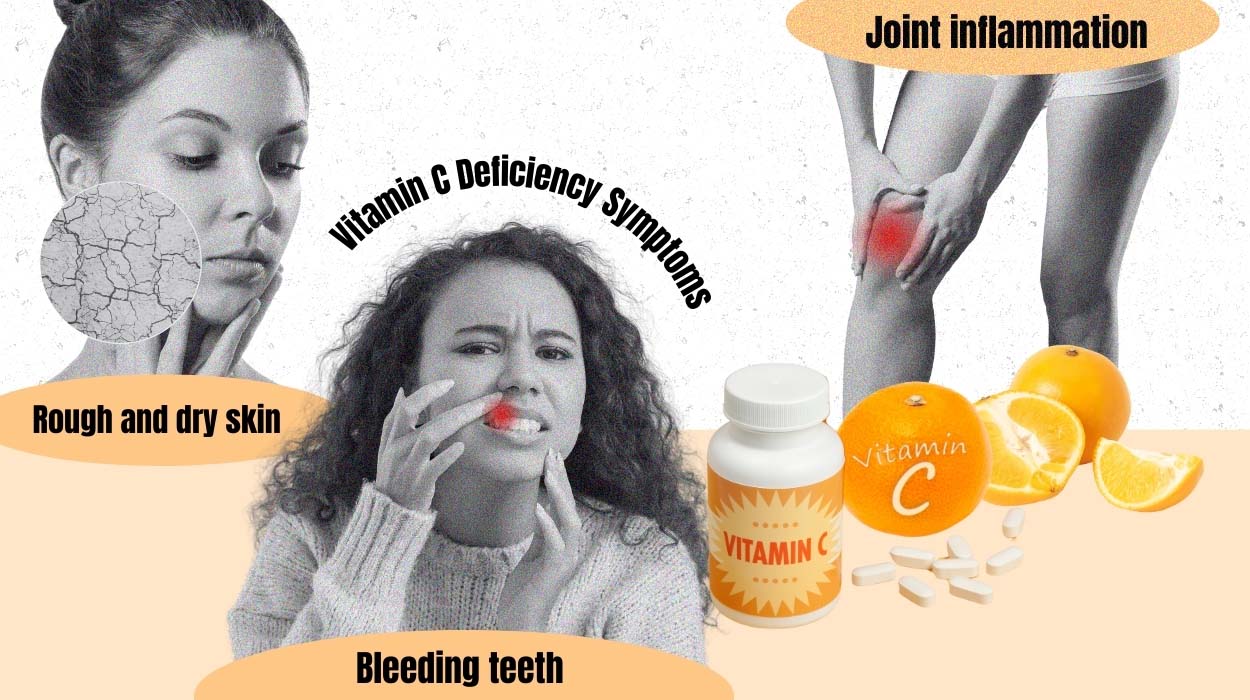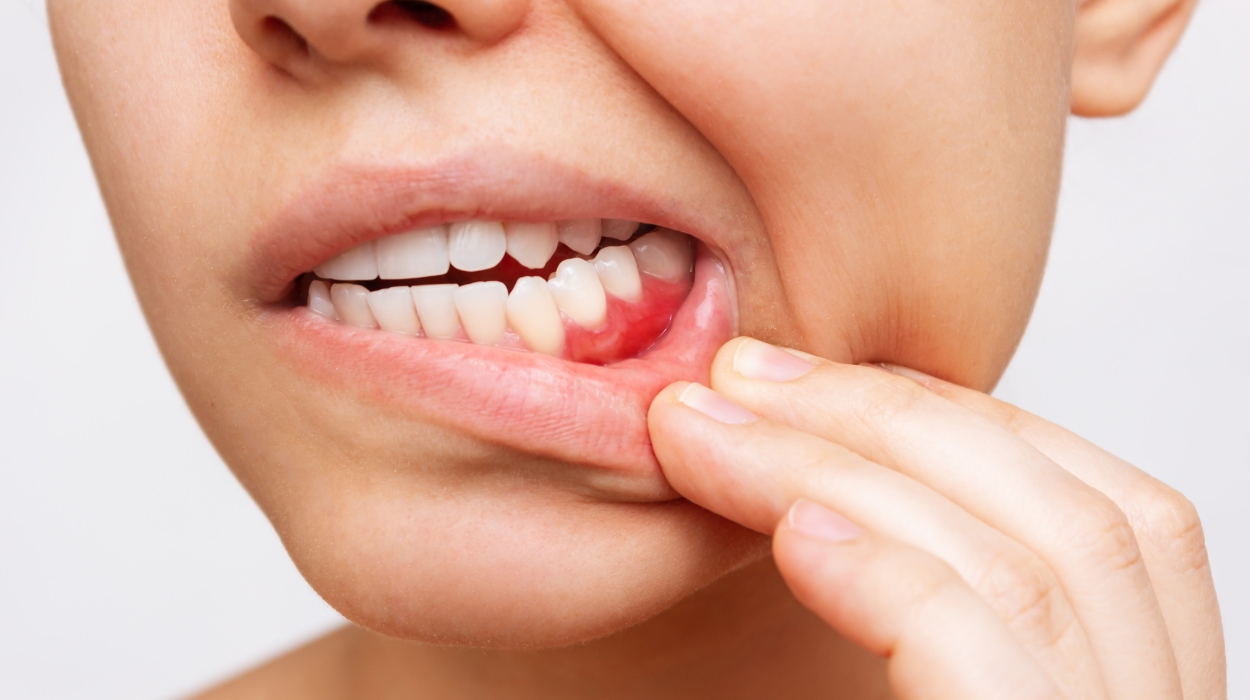 Expert's opinion
Expert's opinion
Expert's opinion
The article is a subjective view on this topic written by writers specializing in medical writing.
It may reflect on a personal journey surrounding struggles with an illness or medical condition, involve product comparisons, diet considerations, or other health-related opinions.
Although the view is entirely that of the writer, it is based on academic experiences and scientific research they have conducted; it is fact-checked by a team of degreed medical experts, and validated by sources attached to the article.
The numbers in parenthesis (1,2,3) will take you to clickable links to related scientific papers.
10 Vitamin C Deficiency Symptoms & Ways To Overcome It In 2024

Vitamin C, also known as ascorbic acid, is a water-soluble vitamin with numerous health benefits. It is essential, meaning your body needs it to survive. Getting adequate vitamin C is crucial to maintaining and repairing skin, bone, teeth, and cartilage.
A vitamin C deficiency can be detrimental to health, compromising immune system function, blood vessel health, wound healing, and energy levels. A vitamin C-rich, well-balanced diet can help you avoid these symptoms. Vitamin C supplements can be used to make up for a low-vitamin C diet, but it’s best to get your vitamin C from food.
Ready to learn about the most common symptoms of vitamin C deficiency? Read on! We will also cover high-risk groups and how to best treat a deficiency.
10 Signs Of Vitamin C Deficiency
The most common low vitamin C symptoms are:
- Weak immunity.
- Rough and dry skin.
- Slow wound healing.
- Bleeding teeth and gums.
- Joint inflammation and discomfort.
- Impaired vision.
- Tiredness and cranky mood.
- Weight gain.
- Spoon-shaped fingernails.
- Scurvy.
10 Vitamin C Deficiency Symptoms
According to the U.S. Department of Health, the recommended dietary allowance, or RDA, for vitamin C is 75 milligrams for women and 90 milligrams for men.[1]
Risk factors for a low vitamin C intake include a diet low in fruits and vegetables, smoking, and drug abuse. But how can you tell whether your body isn’t getting enough?
Here are the most common symptoms of vitamin C deficiency to watch out for.
Weak Immunity
Vitamin C deficiency weakens body immunity.
A lack of vitamin C is linked to an increased risk of disease and a more difficult path to recovery. Vitamin C helps protect against infectious illnesses[2] such as pneumonia and urinary tract infections. According to some studies,[3] vitamin C can also lower cancer and cardiovascular disease mortality risk.
Rough And Dry Skin

Lack of adequate vitamin C promotes rough and dry skin.
Vitamin C is necessary for healthy skin[4] and a lack of it may cause your skin to develop a rough appearance. Vitamin C aids in the formation of collagen, a protein required for the flexibility and suppleness of the skin. It also protects against ultraviolet damage when exposed to the sun.
Slow Wound Healing
Vitamin C deficiency slows the natural wound-healing processes.
Vitamin C contributes to the body’s natural healing response to injury. When vitamin C levels are low, the body cannot produce enough collagen to regenerate damaged tissue. Studies show that vitamin C can speed up the healing of broken bones[5] and help manage inflammation.
Vitamin C also helps the body fight infections due to its antimicrobial properties,[2] preventing wounds from becoming infected and speeding up the healing process.
Bleeding Teeth And Gums

Vitamin C is responsible for bleeding teeth and gums.
Severe vitamin C deficiency can lead to swollen and bleeding gums,[6] signs of scurvy. Without adequate intake of vitamin C, your gum tissue and blood vessels may weaken due to low collagen turnover, increasing the probability of bleeding gums. Gums may darken to a purplish tone in the later stages of vitamin C shortage, and teeth may become loose and can even fall out.
Joint Inflammation And Discomfort
Vitamin C deficiency causes joint inflammation and discomfort.
Cartilage pads your joints, preventing the bones from grinding together. However, cartilage is made from collagen and depends on vitamin C for its production. When vitamin C levels are low, cartilage can break down and bone scrapes against bone, causing joint pain and stiffness.[7]
Impaired Vision
Impaired vision is a sign of vitamin C deficiency.
Preliminary research suggests that vitamin C may help prevent age-related vision loss due to cataracts.[8] Cataracts are the clouding of the lens, usually due to age, and are the main cause of blindness.
Vitamin C could be recommended to reduce the risk[9] of developing cataracts. However, more research is needed to determine the best dose for eye health and vision.
Tiredness And A Cranky Mood
Vitamin C deficiency can cause tiredness and a cranky mood.
Another symptom of low vitamin C might be low energy and a gloomy disposition.[10] There are several reasons for this.
Vitamin C is needed to help the body produce energy and synthesize mood-enhancing neurotransmitters and hormones such as adrenaline. It’s also needed for iron absorption. Low vitamin C can increase the risk of iron-deficiency anemia, leading to fatigue.
Weight Gain
A lack of vitamin C can result in weight gain.
Because of its capacity to lower inflammation and limit the release of stress hormones, vitamin C may be beneficial in avoiding weight gain[11] and obesity.
This might be due to vitamin C’s ability to reduce two hormones in particular: the stress hormone cortisol and the hunger hormone leptin. It can also aid weight management by helping to regulate metabolism and inhibit inflammation.
Spoon-Shaped Fingernails
Spoon-shaped fingernails may indicate vitamin C deficiency.
Spoon-shaped fingernails can be a sign of iron deficiency. Because vitamin C is required for the absorption of iron, this might also be a sign of vitamin C deficiency.
The insufficiency can also emerge as red patches or lines in the nail bed due to the fragility of the blood vessels.
Scurvy
Severe vitamin C deficiency can lead to scurvy.
Before the 1700s, sailors were regularly afflicted with scurvy. Even though it is rare today, it is possible to suffer a deficiency if you consume restrictive diets for prolonged periods.
Scurvy symptoms include cracked and brittle fingernails and toenails, twisted or corkscrew hair, weakened blood vessels, impaired wound healing, and loose teeth.
It typically takes three months for a person to fully recover after taking supplemental vitamin C, but you should see some improvement after just one day.
What Is Vitamin C Deficiency?
If you consume a healthy, varied diet high in vegetables, fruits, whole-grain carbohydrates, and lean protein, you should be able to meet your body’s dietary needs. However, nutrient deficiencies develop when the body does not receive enough vitamins from food or dietary supplements.
While the human body can store certain vitamins to protect against low dietary intake, it cannot store vitamin C. Hence, you need to consume enough vitamin C daily to avoid a severe deficiency. A vitamin C deficiency is more common in countries with low to middle-income levels, but it’s not uncommon in high-income areas.[12]
The Problem Of Vitamin C Deficiency
Vitamin C is critical for collagen production, a type of protein that makes up the skin, bones, and cartilage. A lack of vitamin C in the diet may slow or halt the body’s ability to produce new collagen, disrupting the body’s natural healing process and compromising overall health.
You might have heard of scurvy, a disease characterized by poor wound healing. Severe vitamin C deficiency can develop into scurvy, symptoms of which include bleeding lips and gums, anemia, bruising, and poor wound healing.
Scurvy can develop within one month[1] of low vitamin C intake. Detecting early signs of a low vitamin C intake can prevent this condition from developing.
Risks Of Vitamin C Deficiency
Vitamin C is a water-soluble vitamin. This means that the body does not store more than it needs. Excess vitamin C consumed via diet or supplements will come out in the urine. As a result, supplementing vitamin C to correct a deficiency is generally safe, but taking too much could have negative effects such as:
- Vomiting, diarrhea, and nausea.
- Heartburn.
- Skin flushing
- Stomach cramps or bloating.
- Sleepiness and fatigue or sometimes insomnia.
- Headaches.
- Kidney stones.[3]
High amounts of oral vitamin C have been linked to an increased risk of kidney stones in some patients. According to research, vitamin C supplementation between 250-1,500 milligrams[13] taken over an extended period raises the risk of kidney stones, especially in men.
If you suspect an ascorbic acid deficiency, you should talk to a registered dietitian about a repletion regimen.
If you suffer from acid reflux, try taking buffered vitamin C supplements.
Vitamin C Deficiency Treatments
Vitamin C deficiency is treated by increasing nutritional intake through a varied diet or multivitamins.
After a given repletion period, it is normally safe to quit vitamin C dosage. However, after the supplements are stopped, it is critical to maintain a vitamin C-rich diet.[14] A registered dietitian may be consulted if you require assistance.
Scurvy treatment entails taking big doses of vitamin C and consuming foods that naturally contain 1-2 times the RDA for vitamin C. Fruits and vegetables, especially fresh ones, should account for a bigger portion of the diet.
The Bottom Line
Vitamin C is crucial in maintaining healthy biological functions and warding off disease. It promotes healthy blood vessels, supports immune system[2] function, promotes the synthesis of collagen, facilitates the absorption of iron, speeds up the healing of wounds, improves the appearance of skin, and promotes the maintenance and repair of bone, cartilage, and teeth.
A vitamin C deficiency can manifest itself in several ways, including fatigue, gum bleeding, easy bruising and bleeding, joint pain, and rough, bumpy skin. Brittle bones, uneven nails and hair, slower wound healing, and a weaker immune system may result as vitamin C deficiency progresses. Inflammation, anemia caused by a lack of iron and vitamin C, and rapid weight gain are some other warning indicators. The good news is that symptoms of vitamin C deficiency typically resolve after low levels are restored.
+ 14 sources
Health Canal avoids using tertiary references. We have strict sourcing guidelines and rely on peer-reviewed studies, academic researches from medical associations and institutions. To ensure the accuracy of articles in Health Canal, you can read more about the editorial process here
- Nih.gov. (2020). Office of Dietary Supplements – Vitamin C. [online] Available at: https://ods.od.nih.gov/factsheets/VitaminC-HealthProfessional/.
- Carr, A.C. and Maggini, S. (2017). Vitamin C and Immune Function. Nutrients, [online] 9(11), pp.1211–1211. doi:https://doi.org/10.3390/nu9111211.
- Xu, K., Peng, R., Zou, Y., Jiang, X., Sun, Q. and Song, C. (2022). Vitamin C intake and multiple health outcomes: an umbrella review of systematic reviews and meta-analyses. International Journal of Food Sciences and Nutrition, [online] 73(5), pp.588–599. doi:https://doi.org/10.1080/09637486.2022.2048359.
- Pullar, J.M., Carr, A.C. and Margreet C.M. Vissers (2017). The Roles of Vitamin C in Skin Health. Nutrients, [online] 9(8), pp.866–866. doi:https://doi.org/10.3390/nu9080866.
- DePhillipo, N.N., Aman, Z.S., Kennedy, M.I., Begley, J., Moatshe, G. and LaPrade, R.F. (2018). Efficacy of Vitamin C Supplementation on Collagen Synthesis and Oxidative Stress After Musculoskeletal Injuries: A Systematic Review. Orthopaedic Journal of Sports Medicine, [online] 6(10), p.232596711880454-232596711880454. doi:https://doi.org/10.1177/2325967118804544.
- Murererehe, J., Anne Marie Uwitonze, Pétrorille Nikuze, Patel, J. and Razzaque, M.S. (2022). Beneficial Effects of Vitamin C in Maintaining Optimal Oral Health. Frontiers in Nutrition, [online] 8. doi:https://doi.org/10.3389/fnut.2021.805809.
- Aghajanian, P., Hall, S.A., Wongworawat, M.D. and Mohan, S. (2015). The Roles and Mechanisms of Actions of Vitamin C in Bone: New Developments. Journal of Bone and Mineral Research, [online] 30(11), pp.1945–1955. doi:https://doi.org/10.1002/jbmr.2709.
- Lim, J.C., Arredondo, M., Braakhuis, A.J. and Donaldson, P.J. (2020). Vitamin C and the Lens: New Insights into Delaying the Onset of Cataract. Nutrients, [online] 12(10), pp.3142–3142. doi:https://doi.org/10.3390/nu12103142.
- Wei, L., Ge, L., Cai, C. and Lv, J. (2015). Association of vitamin C with the risk of age-related cataract: a meta-analysis. Acta Ophthalmologica, [online] 94(3). doi:https://doi.org/10.1111/aos.12688.
- Tardy A, Etienne Pouteau, Marquez, D., Yilmaz, C. and Scholey, A. (2020). Vitamins and Minerals for Energy, Fatigue and Cognition: A Narrative Review of the Biochemical and Clinical Evidence. Nutrients, [online] 12(1), pp.228–228. doi:https://doi.org/10.3390/nu12010228.
- Garcia-Diaz, D.F., Lopez-Legarrea, P., Quintero, P.A. and J. Alfredo Martínez (2014). Vitamin C in the Treatment and/or Prevention of Obesity. Journal of Nutritional Science and Vitaminology, [online] 60(6), pp.367–379. doi:https://doi.org/10.3177/jnsv.60.367.
- Rowe, S.M. and Carr, A.C. (2020). Global Vitamin C Status and Prevalence of Deficiency: A Cause for Concern? Nutrients, [online] 12(7), pp.2008–2008. doi:https://doi.org/10.3390/nu12072008.
- Jiang, K., Tang, K., Liu, H., Xu, H., Ye, Z. and Chen, Z. (2019). Ascorbic Acid Supplements and Kidney Stones Incidence Among Men and Women: A systematic review and meta-analysis. PubMed, [online] 16(2), pp.115–120. doi:https://doi.org/10.22037/uj.v0i0.4275.
- Doseděl, M., Eduard Jirkovský, Kateřina Macáková, Lenka Kujovská Krčmová, Lenka Javorská, Pourová, J., Mercolini, L., Remião, F., Nováková, L. and Přemysl Mladěnka (2021). Vitamin C—Sources, Physiological Role, Kinetics, Deficiency, Use, Toxicity, and Determination. Nutrients, [online] 13(2), pp.615–615. doi:https://doi.org/10.3390/nu13020615.



